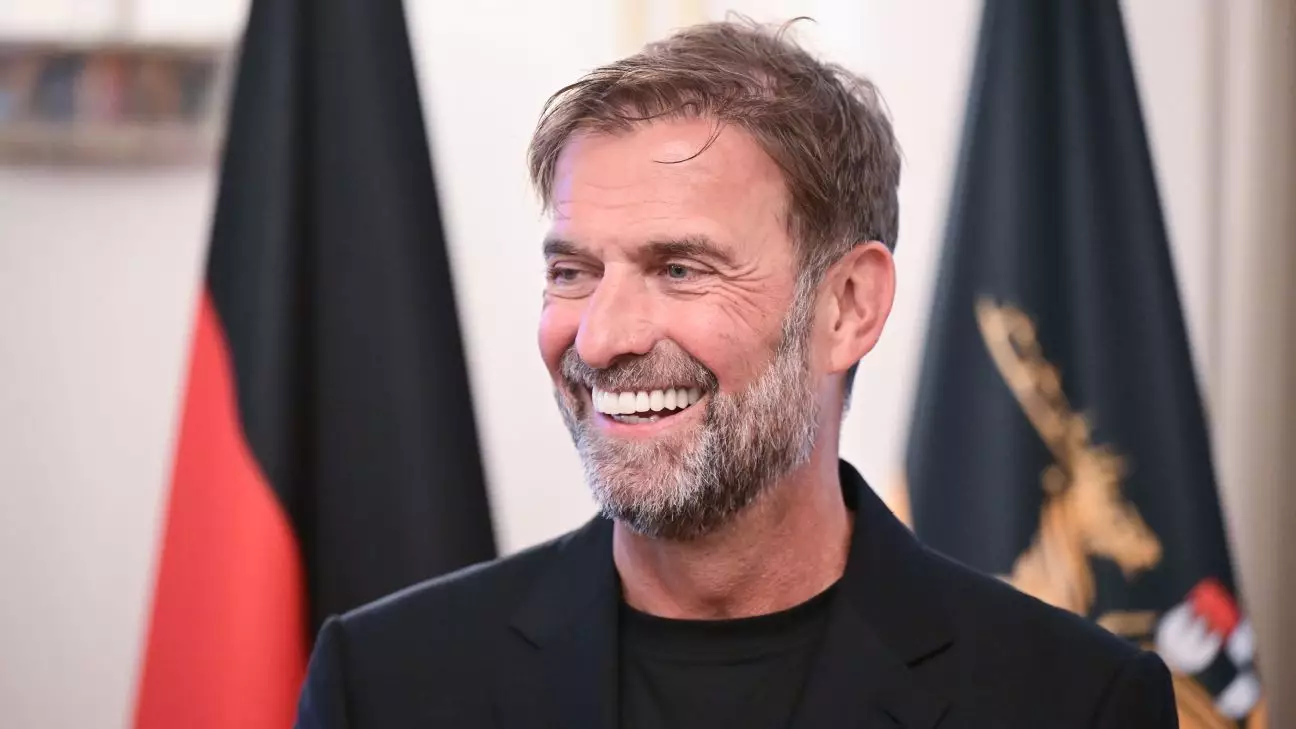In the expansive world of football, few figures command as much respect and recognition as Jürgen Klopp. Though it has been nearly a decade since Klopp transitioned from Germany’s domestic leagues to the international stage, his presence is omnipresent within the Bundesliga. With his cheerful disposition and charismatic humor, he has become the face of various advertising campaigns, advocating everything from fitness equipment to automobiles. However, his recent announcement to assume a pivotal role with Red Bull, a company that has often drawn controversy in Germany, has ignited a firestorm of debate among fans and analysts.
Red Bull has blazed a unique trail in football, establishing teams like RB Leipzig and RB Salzburg while bypassing traditional practices concerning club ownership in Germany. The company’s method involved purchasing a lesser-known club, SSV Markranstadt, and restructuring it under their leadership. This move has alarmed many traditionalists amid German football’s adherent 50+1 rule, which aims to ensure fan involvement in club governance. As such, many supporters regard Red Bull as a disruptor, a label that becomes more contentious with Klopp’s alignment to the brand.
The recruitment of Klopp by Red Bull CEO Oliver Mintzlaff raises eyebrows, especially considering Klopp’s prior reputation as the voice of the people. While his decision to join RB promotes the notion of friendship and networking—three former colleagues from his Mainz days are now coaching RB Leipzig, Salzburg, and New York Red Bulls—the backlash against Red Bull remains fierce. A significant portion of the German football community registered disapproval of Klopp’s decision, as expressed in Kicker’s poll where an overwhelming 72% reacted negatively.
The reaction to Klopp’s new role starkly contrasts the typical reception athletes might expect in England. Here, one often finds a more accommodating attitude that acknowledges individual desires and career choices. In Germany, however, the reaction is layered with socio-cultural complexity. The passionate affection for football here is often entangled with community values and historical significance, creating a “cultural shock” when commercial forces invade sacred spaces.
This sense of discontent is underscored by Kicker Magazine’s featuring Klopp with the headline “Kultur-Schock.” Critics argue that by aligning with Red Bull, Klopp compromises his image as a supporter of traditional values in the sport. In a recent discussion on Sport1, former Eintracht Frankfurt official Fredi Bobic voiced praise for Red Bull’s operational strategies, igniting further debate about the essence of what constitutes “proper football” in Germany. To some, Klopp heading this direction signifies a problematic endorsement of commercialism over community.
As German football grapples with these changes, the coaching landscape has also been reshaped. Julian Nagelsmann has taken charge of the national team, steering a clear course toward a modern footballing philosophy that embraces performance over historical allegiance. His approach epitomizes a shift toward meritocracy where players earn their spots based on current form rather than past reputations.
Nagelsmann’s recent successes, evident in a seamless transition to the UEFA Nations League quarterfinals, speak volumes about a changing ethos. Players like Jamie Leweling and Tim Kleindienst are prime examples of emerging talent that reflects Nagelsmann’s willingness to develop players based on merit. This evolution starkly contrasts with the past, where certain clubs’ dominance often dictated national selections.
Additionally, other clubs like Hoffenheim, overseen by Pellegrino Matarazzo, face pressure to perform amidst murmurs of managerial change. However, Matarazzo’s recent performances have temporarily quelled dissent, buoyed by a structure that rewards competence rather than a connections-based hierarchy.
As Jürgen Klopp embarks on this new chapter with Red Bull, he finds himself at a critical junction—one that not only challenges his persona but the broader landscape of football in Germany. His choice reflects personal ambition, yet it clashes squarely with the ingrained principles that have long defined the sport for many fans.
With changing tides in coaching philosophies and the balance of commercial interests, the future of German football remains uncertain but ripe for reinvention. Klopp’s acceptance of this role provides a fascinating lens through which to examine the interplay of tradition and modernity, creating both excitement and unease among those who cherish the beautiful game’s multifaceted allure. The question remains: will this move ultimately herald a new era for German football, or will it serve as a cautionary tale about the impact of commercialism on cherished sporting divisions?

